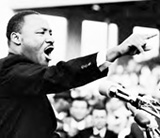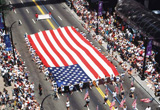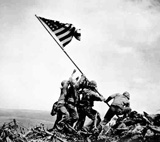
American National Holidays can hamper your enjoyment of New York City for a day: While the city undeniably never sleeps, trying to make the most of a day while everybody else is enjoying their traditional holiday can be a hassle on both ends.
It's a confusing one: in order to avoid some holidays falling on weekends and being shifted to either the Friday before or the Monday after, the 1968 Uniform Holidays Act changed it to certain days of certain weeks of certain months.
Let this cheat sheet be your guide:
New Year's. January 1. Be prepared for a decrease of open establishments starting at midnight as New York City celebrates the arrival of the New Year. Just go to Times Square along without the thousands of people that gather there to celebrate a new beginning in our calendar.

Martin Luther King, Jr. Day. Third Monday in January. First observed in 1986, this holiday honors Civil Rights icon Martin Luther King, Jr. In reality, he was born on January 15 but initial opposition to its celebration led to it being combined with other holidays in several states which prompted the Government to leave it on the third Monday the year.
Washington's Birthday. Third monday in February. One of the nation's most veteran holidays, it never actually falls on George Washington's birthday since he was born on February 22. The way it was changed in 1968 makes its celebration happen between February 15 and 21. This has led many Americans (including state and local governments) to call this holiday "President's Day" instead. So far, section 6103(a) of title 5 of the United States Code begs to differ.
Memorial Day. Last Monday in May.. Traditionally celebrated on May 30 until it was changed, this salute to the nation's fallen soldiers from the Civil War onwards also marks the unofficial beginning of the summer season in a roundabout way.

Independence Day. July 4. While it will be practically impossible for you to ignore this day if you spend it on American soil, it can be a very interesting holiday to share with the Americans: all stops are usually pulled in spectacular celebration of the signing of the Declaration of Independence from British rule. Picture it as being America's birthday. And yes, you are invited.
Labor day. First Monday in September. Dreaded by schoolchildren as it represents the end of their summer vacation, this is the day where working Americans take a break from their jobs to think about their own achievements.
Columbus Day. Second Monday in October. Celebrated by many countries in Latin America as well as in Spain on October 12, this day commemorates the anniversary of Christopher Columbus' discovery of the Americas. This is actually a very interesting day to spend in New York, particularly in The Bronx, where the Italian presence has always been strong -- Americans of Italian descent have adopted holiday as a celebration of their heritage because the man who Columbus Day happen was a first-generation Italian called Angelo Noce.

Veterans Day. November 11. At 11 am, November 11, Germany signed the Armistice that put the worst part of World War I to an end. America likes to stop and commemorate the end of their first major international war and honor those who died in it.
Thanksgiving Day. Fourth Thursday in November. Make sure you have some close American friends or relatives if you are going to be in New York today. Thanksgiving is the great American family holiday, more so than Christmas (which not all ethnic groups celebrate). Extending all the way from Thursday to Monday the next week, there's little activity outside the family houses where Americans celebrate the giving of thanks for the autumn harvest with a traditional turkey dinner. It also precedes Black Friday, where most stores offer considerable discounts on their products for 24 hours marking the start of Christmas season.
Christmas. December 25. It started out as the day when Western Christians celebrated the birth of Jesus Christ. However, its pagan, unofficial traditions (dinner, exchange of gifts) are so universal that they started to catch on to society in general. It is now an official holiday, and if you are in New York during those days (and it's the best place in the world you can spend them) you will notice the word Christmas is very scarcely used in commercial and public discourses in order to eschew its Christian connotations.